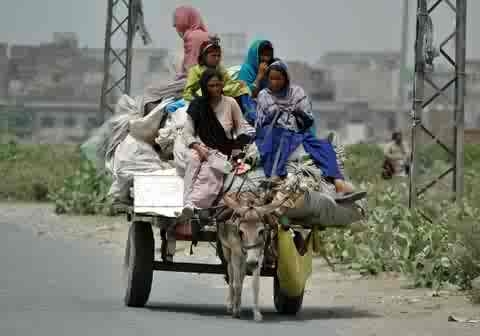And under Pakistani law, families can escape punishment by following a few simple steps: a brother ‘confesses’ to having killed his sister. His father ‘forgives’ him, or accepts blood money. No money actually changes hands and the matter is closed.
“This is a terrible brutalisation of society. It is outrageous that such crimes take place,” Asma Jahangir, a leading lawyer, rights activist and United Nations rapporteur said.
According to a report prepared by the Karachi-based Aurat Foundation, a non-governmental organisation active in monitoring women’s rights, the largest number of deaths in January, 17, took place in the southern province of Sindh.
In its annual report for 2006, released in February, the Human Rights Commission of Pakistan (HRCP) recorded at least 565 cases of honour killings.
Yet the actual number could be significantly higher given that many such deaths - particularly in remote rural areas - are never reported, activists said.
Under the practice, as it is carried out in Sindh, the southwestern province of Balochistan and areas of the southern Punjab adjacent to Sindh, a man or woman thought to be engaged in any kind of relationship outside marriage, or having decided to marry by choice, are killed.
Quite often, the verdict is delivered by a village jirga (tribal gathering). A spokesman for the Aurat Foundation said jirgas on women’s issues continue to be held, despite a ban.
In the Punjab, allegations of having ‘dishonoured’ the family are made after suspicions of a romantic or sexual relationship outside marriage.
However, according to the human rights commission and other rights organisations, the murder is committed to settle a property dispute or other matter, and the name of an ‘honour killing’ is applied in the hope that the police and the judiciary will be more lenient.
|
“We have noted no significant decrease in the number of such killings since the law was enforced in early 2005. As we have stated previously, until the issue of compoundability, which makes it possible for blood money to be paid to compensate for physical hurt, is addressed, there is unlikely to be any real change in the situation,” the rights commission’s director IA Rehman told IRIN.
Opposition from religious leaders, who have termed the practice ‘un-Islamic’ has made little difference to the situation.
Some of the deaths reported under this traditional practice have been horrendous. At the end of January, a couple was dragged out of a hut in the village of Donga Bonga in the southern Bhawalnagar district of the Punjab, tied to a tree and clubbed and stoned to death.
The victims, Elahi Hussain, 40, a divorced woman, and fellow villager Hafiz Shah, 45, were accused of engaging in an extra-marital relationship. Three of the female victim’s brothers and a cousin carried out the killing, with the knowledge of most villagers. Two of the men have been arrested.
Rights activists say that in the past decade, honour crimes have spread to larger towns and cities from the traditional rural heartlands.
At least five cases were reported in February alone from Pakistan’s larger cities of Lahore, Karachi and Faisalabad.
kh/ds/ar/mw
This article was produced by IRIN News while it was part of the United Nations Office for the Coordination of Humanitarian Affairs. Please send queries on copyright or liability to the UN. For more information: https://shop.un.org/rights-permissions





